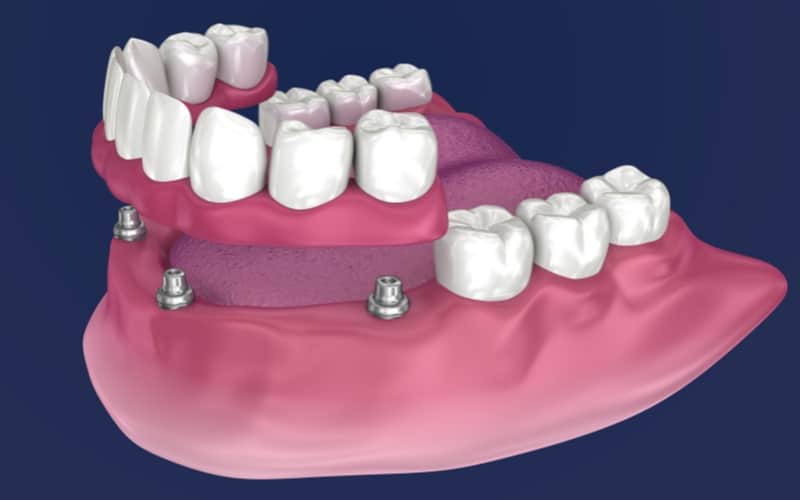Call: (810) 674-3060
Sensitive Gums? Tips for Making Dentures More Comfortable

Sensitive gums are a common challenge for denture wearers. While dentures are beneficial for restoring smiles and chewing function, they can lead to gum discomfort when they don’t fit well or when gums are particularly sensitive. Denture-related pain and irritation may discourage people from wearing their dentures, which impacts oral health and can disrupt daily routines.
Ensure a comfortable fit for anyone with sensitive gums. Addressing gum discomfort promptly is essential, as it allows you to live confidently with your dentures and minimizes health issues that discomfort can cause. This blog will explore practical tips and solutions to help make dentures more comfortable for those with sensitive gums so you can enjoy a pain-free, confident smile.
Common Causes of Denture Discomfort
Several factors can contribute to denture discomfort, especially for people with sensitive gums. Here’s a look at the most common causes:
- Ill-Fitting Dentures:
Poorly fitting dentures are one of the leading causes of gum discomfort. Dentures that do not fit snugly may rub against the gums, causing sore spots and irritation.
Loose dentures can shift around while talking or eating, putting extra pressure on sensitive areas of the gums. This can lead to persistent soreness, making dentures uncomfortable to wear.
- Gum Sensitivity or Allergies:
Some people experience gum sensitivity or even allergic reactions to materials in their dentures. Denture bases, often made from acrylic or metal, may irritate those with sensitive skin.
Additionally, certain adhesives or liners can lead to redness or itchiness in sensitive gums, making it difficult to achieve a comfortable fit.
- Oral Health Changes:
Gum tissue and bone structure can change over time, especially in those who have had tooth extractions. Bone resorption, or the natural breakdown of bone tissue, can alter the gum’s shape and the fit of dentures.
As gums shrink and change shape, dentures may become loose and start to press uncomfortably against the sensitive areas of the gums.
- Dry Mouth:
Saliva is crucial in creating a natural cushion between the dentures and gums. When saliva production decreases, as with dry mouth, dentures may create friction against the gums, leading to irritation and discomfort.
Dry mouth can be caused by certain medications, aging, or other health conditions and can significantly impact denture comfort.
Tips to Get Comfortable Dentures
Here are some effective tips to make dentures more comfortable for sensitive gums:
- Tip #1: Focus on Proper Fitting and Adjustments
A well-fitted denture reduces gum irritation and enhances comfort. Regular visits to a dentist ensure your dentures fit correctly, reducing the risk of friction or pressure on sensitive gums.
Soft relines or cushioning liners are helpful options for comfort, as they offer a gentle layer between the denture and the gums. Dentists can also adjust dentures to match changes in gum tissue over time, ensuring a comfortable, lasting fit.
- Tip #2: Use Denture Adhesives Carefully
Denture adhesives help stabilize dentures, preventing them from moving around and causing irritation. Choose a high-quality adhesive that provides lasting hold without excess residue. Applying a small amount of adhesive evenly helps keep dentures secure without overuse.
Avoid using too much adhesive, as excess can be difficult to clean and may cause gum irritation. Clean adhesives from dentures daily to prevent buildup that can lead to discomfort.
- Tip #3: Keep Dentures and Mouth Clean
A clean mouth and dentures reduce the risk of gum irritation from bacteria and plaque buildup. Brush and soak dentures daily to remove debris.
Rinse your mouth with water or a mild mouthwash after meals to flush out bacteria and food particles. Gently brush your gums daily to promote healthy tissue and reduce the chance of inflammation caused by plaque.
- Tip #4: Give Gums a Break with Nightly Removal
Removing dentures at night allows gums to rest and recuperate. It reduces the risk of denture pressure leading to sore spots.
Soaking dentures in a cleaning solution overnight keeps them hygienic and maintains their shape, which helps them fit better in the long term. Nightly removal gives gums a much-needed break, especially for those prone to sensitivity.
- Tip #5: Try Soothing Remedies for Sensitive Gums
Saltwater rinses help reduce inflammation and soothe sore gums. To alleviate discomfort, rinse with warm salt water twice a day. Over-the-counter gels or balms designed for sensitive gums can provide temporary relief from irritation.
Always consult your dentist before trying new products to ensure they’re safe for sensitive gums and won’t worsen discomfort.
- Tip #6: Consider Soft Liners or Custom Cushions
Soft liners are flexible materials applied to the denture’s base, creating a softer layer that reduces gum pressure. They are especially beneficial for people with tender gums, as they offer extra cushioning and absorb pressure.
However, soft liners need replacement periodically and may not be suitable for everyone. Consult with a dental professional to see if a soft liner could improve your comfort.
- Tip #7: Pay Attention to Diet and Hydration
Eating soft foods that are easy to chew can reduce gum irritation and denture movement. Avoid sticky or hard foods that may shift dentures or press against the gums.
Staying hydrated keeps the mouth moist, reducing the friction that a dry mouth can cause. A balanced diet with plenty of water supports oral health and helps maintain gum comfort for those with dentures.
The Importance of Regular Dental Check-ups for Denture Wearers
Routine dental check-ups ensure a comfortable fit and maintain gum health. Dentists can monitor gum tissue and bone structure changes that may require denture adjustments.
Regular appointments help detect any signs of gum sensitivity or potential sores early, preventing discomfort from worsening. Dentists can also offer advice on caring for dentures, reducing the risk of buildup or gum irritation.
Routine visits provide peace of mind, allowing you to adjust your dentures and keep your gums as comfortable as possible. Seeing a dentist twice a year is recommended for those with sensitive gums. Adjustments, care tips, and professional support can make a noticeable difference in denture comfort and overall oral health.
Taking the time to care for sensitive gums is key to enjoying a comfortable, healthy denture experience. Regular adjustments, thorough cleaning, and periodic breaks help keep dentures comfortable and prevent irritation. Working with a dentist ensures a personalized approach that meets your unique needs and keeps your gums in top shape.
These simple steps can effectively manage sensitive gums and denture discomfort. Staying proactive with these tips helps you prioritize your comfort, ensuring a happier and more confident life with dentures.




